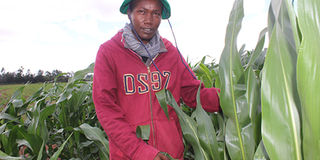E-voucher system for small farmers to access inputs starts in October

Uasin Gishu farmer Raymond Kibor, in his maize farm in Soy in this past photo. Smallholder farmers will soon start receiving e-vouchers from the government to enable them to access inputs like fertilisers. PHOTO | FILE | NATION MEDIA GROUP
What you need to know:
- The new tool is expected to facilitate farmers’ access to subsidised soil testing services, seeds, fertilisers, post-harvest handling tools and other inputs needed to increase production after the government scrapped off a decade-long subsidy scheme implemented by the National Cereals and Produce Board.
- According to Prof Boga, the government will henceforth engage in farmer support programmes using the electronic system hosted on mobile telephony.
- The first batch of farmers will be drawn from the maize-growing areas of Uasin Gishu, Trans Nzoia, Nandi, and Bungoma; coffee growing counties of Nyeri, Embu, Meru, and Kericho; the Irish potato growing counties of Nyandarua and Elgeyo-Marakwet and rice-growing areas in Kirinyaga and Kisumu.
- About 85 per cent of Kenya’s farming population consists of smallholder farmers, making up about three million producers.
Smallholder farmers will soon start receiving e-vouchers from the government to enable them to access inputs like fertilisers.
The initiative, according to Agriculture Principal Secretary Hamadi Boga, will begin in the short rains season this October and they expect some 200,000 farmers to benefit from the e-voucher system as government re-engineers the way it offers assistance to food producers.
The new tool is expected to facilitate farmers’ access to subsidised soil testing services, seeds, fertilisers, post-harvest handling tools and other inputs needed to increase production after the government scrapped off a decade-long subsidy scheme implemented by the National Cereals and Produce Board.
The NCPB-serviced scheme mainly focused on procuring fertiliser for distribution to farmers, which was criticised for opaqueness, inefficiency and benefiting middlemen at the expense of growers.
“Even though some figures say we served 700,000 farmers with the fertiliser, that has never been confirmed. People had to go to the NCPB for the fertiliser, which created hurdles. In between, some of it may have been repackaged and resold,” said the PS.
According to Prof Boga, the government will henceforth engage in farmer support programmes using the electronic system hosted on mobile telephony. “We’re still in the preparatory stages. It is an innovative way of supporting farmers that cuts out cartels, rent-seeking and corruption,” he said.
The new scheme will put in the hands of farmers a 40 per cent incentive, in an arrangement where they will have to contribute the remaining 60 per cent of the cost of whatever input they are purchasing.
Each e-voucher, to be accessed by farmers as an SMS, will be allocated a value of about Sh20,000 per acre. It will only be redeemable at pre-qualified and registered agrovets around the country.
GRADUATE INTO COMMERCIAL FARMING
And only those with not more than five acres will get the government support. The moment the farmer redeems their input at the agrovet, it will show in the ministry’s system who it is, when and what they have redeemed.
Participating agrovets will receive the 40 per cent (government) share from Kenya Commercial Bank in real-time, in a system supported by both the KCB and Safaricom.
“This is not a subsidy, rather an incentive to spur the right farming practices amongst our small farmers. The programme seeks to incentivise small farmers to learn that they need to incorporate the right agronomic practices, the correct inputs, timings and seeds to get high yields. In the programme, we’ll teach farmers that they need to test their soils regularly,” said the PS.
In the first three years, the programme targets to reach about 200,000 farmers, who are then expected to graduate into commercial farming.
The first cycle will focus of maize, potato, rice and coffee farmers.
The first batch of farmers will be drawn from the maize-growing areas of Uasin Gishu, Trans Nzoia, Nandi, and Bungoma; coffee growing counties of Nyeri, Embu, Meru, and Kericho; the Irish potato growing counties of Nyandarua and Elgeyo-Marakwet and rice-growing areas in Kirinyaga and Kisumu.
Other counties in eastern, western and Coast are already accessing the e-voucher under the KCEP-CRAL project funded through the International Fund for Agricultural Development (IFAD).
Under the programme, enrolled farmers will benefit from the government incentive for three years before being introduced and handed over to other agricultural financial institutions like Commodities Fund and Agricultural Finance Corporation (AFC) for financial support if necessary. The plan by government is to graduate small farmers into commercial farming.
About 85 per cent of Kenya’s farming population consists of smallholder farmers, making up about three million producers.
“The e-voucher is very important because we will register the farmers ourselves. We shall know the location of the farm, we will geo-reference it, make sure the soil is tested and after that we’ll make sure they get the right inputs,” said the PS.





